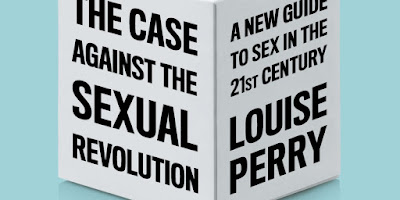We remain in Chapter 6 of Louise Perry's
The Case Against the Sexual Revolution entitled "Violence is Not Love."
Last week I discussed the troubling rise of choking during sex among the younger generations, a trend associated with widespread pornography consumption and one that is adversely affecting the mental health of young women.
And yet, it could be argued that both Perry and I are moralizing here. Maybe young women like being choked? Maybe we're just prudes who are opposed to kink?
One bit of evidence here for that argument is/was the popularity of the BDSM erotica of the book and movie Fifty Shades of Grey. Hundreds of thousands of women, if not millions, read the book and watched the movie. Clearly there is a widespread desire out there among women for BDSM kink. Some women do like being tied down, spanked, whipped, and choked during sex. Some women do have rape fantasies. Consequently, aren't we, as moralizing prudes, stigmatizing these desires and the women who have them? Again, let people do what they want in the bedroom!
How does Perry address this argument?
Perry puts much of the appeal of Fifty Shades of Grey upon male possessiveness, and how this hits the erotic buttons of female sexual psychology. Recall, from earlier in this series, the impact of evolution upon female mate choice. Specifically, given the reproductive challenges women faced in Stone Age contexts, women evolved to identify "high investment" mates. Male focus and exclusive attention were therefore erotic cues. In modern language, a male being "really into you" was arousing. Exclusive and focused attention signals care, investment, and love. In fantasy, these attentional cues can be pushed to become superstimuli, where male attention become obsessive, his entire world now orbiting you. This obsessive attention from a desired male hits female sexual psychology in its sweet spot. It's the exact opposite of that dud of a husband who never listens to you, barely notices you, and only watches sports on TV. In contrast to that, wouldn't it be arousing to have a gorgeous, rich man be obsessed with you?
That's the erotic appeal in Fifty Shades of Grey. Importantly, beyond obsession, there are other erotic cues involved here. As I mentioned, we want this obsessed man to be both handsome and rich, exactly like Christian Grey. This is critical to the erotic fantasy. If Christian Grey was a poor and ugly man he's not becoming an object of erotic desire, no matter how obsessed he is. In fact, that dude would be a stalker and we'd call the police on him. This erotic desire for good looks and wealth also goes back to an evolutionary logic. The "high investment" mate you're looking for isn't just investing attention, but also resources, both genetic and material. Stepping back, Christian Grey has all of these: He's gorgeous. He's rich. And he's obsessed with Anastasia. All the ingredients for an erotic fantasy are there. Here's Perry describing this:
Christian Grey is a violent, controlling brute, but his obsessive behavior towards Anastasia does at least demonstrate his unwavering commitment to her. Fifty Shades adds a whips-and-chains aesthetic, but many older romance novels are centered on much the same dynamic: the strong handsome man who falls head over heels in love with the heroine and will do anything to have her, up to and including being violent.
...There is variation within the romance genre, and heroes may be more or less aggressive depending upon the particular book, but one theme remains consistent: the consumers of women's erotic fiction have never been turned on by a man who plays hard to get, wavers in his interest, or is distracted by the attentions of other women. Long before Fifty Shades came along, what these readers were aroused by is the fantasy of a man who is really into them, often obsessively so.
As Perry goes on to note, while obsessive, violent men might be erotically attractive in fantasy, violent and obsessive men are not the best partners in real life. We know, for instance, that the number one cause of domestic violence is male jealousy. And this creates one of the saddest and most tragic aspects of domestic violence, how abused women interpret violence as obsessive and exclusive interest in her, that abuse is a sign of love. According to Perry, this confusion is also behind why many young women are now consenting to being choked during sex. Perry writes:
Sadly, images of strangulation shared or liked by women on social media...and testimony that I've heard directly from many young women all suggest that many of the women who seek out strangulation have a very particular--and very misguided--understanding of what strangulation means when men do it to them during sex.
To put it bluntly, many of these women are as deluded as the victim of domestic violence...who 'imagines--falsely--that a punch in the face or a hand around the throat is at least a sign of his continued interest in her.' They think strangulation indicates a man's love, passion and desire for them. More often than not, it indicates none of these things, but, in a culture in which the differences between male and female sexuality are routinely denied, particularly by liberal feminists, it shouldn't surprise us that many of these young women take the lead from erotic fiction such as Fifty Shades and misinterpret aggression from their male partners as a sign of passion...




















